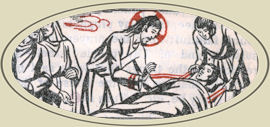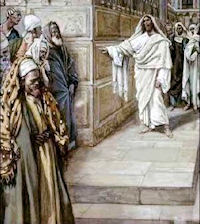» Enjoy our Liturgical Seasons series of e-books!
Jesus said to them, "Did you never read in the Scriptures: The stone that the builders rejected has become the cornerstone; by the Lord has this been done, and it is wonderful in our eyes? Therefore, I say to you, the kingdom of God will be taken away from you and given to a people that will produce its fruit" (Mt 21:42-43).
Today is the feast of St. Francis of Assisi which is superseded by the Sunday Liturgy.
Click here for commentary on the readings in the Extraordinary Form of the Roman Rite.
Sunday Readings
The first reading is taken from the Book of the Prophet Isaiah 5:1-7. Under the image of a wine-grower who had done everything he could to make his vineyard fertile and productive, the prophet describes God's care for and interest in his Chosen People.
The second reading is from the Letter of St. Paul to the Philippians 4:6-9. St. Paul is encouraging his converts to put their full trust in God.
The Gospel is from Matthew 21:33-43. There are two leading thoughts that come to the mind of any true believer on hearing this parable: the infinite goodness, patience and mercy of God in His dealings with mankind, and the unsounded depths of wickedness and ingratitude to which men can sink. To His Chosen People of the Old Testament, God had given a fertile and fully-equipped vineyard — His revelation, His protection, a homeland of their own in Canaan, and all this in order to prepare them for the future Messiah, who would bring them an eternal home in God's own Kingdom. All He asked in return was their cooperation.
But they had other plans; they wanted their kingdom on earth. Yet God was patient with them; again and again He pardoned their infidelities. He sent them prophet after prophet to recall them to their senses, but they maltreated these messengers of God and refused to heed their warnings.
Then "the fullness of time" came and He sent His divine Son on earth in human form. He took His human nature from one of their race, lived among them and preached His gospel of love and peace to them. He tried to soften their hard hearts, and made them the final offer of the Father's mercy and pardon. But instead of accepting God's offer of mercy the chief priests and elders only made it an occasion of an even greater sin. To their crimes of infidelity and injustice they added the murder of God's Messiah and Son.
In God's plan of love and mercy the tragedy of Calvary turned out to be the great "triumph of failure." That death brought life to the world and opened the gates of God's eternal kingdom for all nations and races. The Gentiles rallied around the standard of Christ. A new vineyard was set up in which all men could work for their Father in heaven and for their own eternal interests.
We Christians today are the successors of the first Gentile followers of Christ. We too have been called to work in God's vineyard. Are we working honestly and devotedly? Are we producing the grapes and the wine that our divine Master expects of us? If our answer is "yes, I am living a true Christian life, I am working for God's honor and glory and for my own eternal salvation," then we can say a heartfelt "thank you" to our merciful Father, and ask him to keep us ever on this right path. But if our answer is "no," then let us pay heed to today's lesson. What happened to the chief priests and elders can and will happen to unfaithful Christians if they persevere in their infidelity and disobedience. But we can still put ourselves right with God. Let us do it today — tomorrow may be too late.
Excerpted from The Sunday Readings by Fr. Kevin O'Sullivan, O.F.M.
 Commentary on the Readings for the Eighteenth Sunday after Pentecost
Commentary on the Readings for the Eighteenth Sunday after Pentecost
"Jesus, seeing (the) faith (of those who brought the paralytic) said. . .'Take courage, son; thy sins are forgiven thee'" (Gospel).
We approach the end of the Church's year. We, too, have grown to maturity. In our youth we regarded perfection an easy accomplishment. Now we plead for Redemption. We implore Hi Mercy to direct our hearts (Prayer) in the evening of our life (Offertory).
Our plea today is: Give peace, O Lord. What is the condition for peace with neighbor, peace amongst nations? It is a call to set ourselves right with God!
Are we ambassadors of peace to others? The paralytic was unable to do anything for himself. Did not Jesus cure him, absolve him, only when his friends brought him and He saw their faith?
Excerpted from My Sunday Missal, Confraternity of the Precious Blood








